
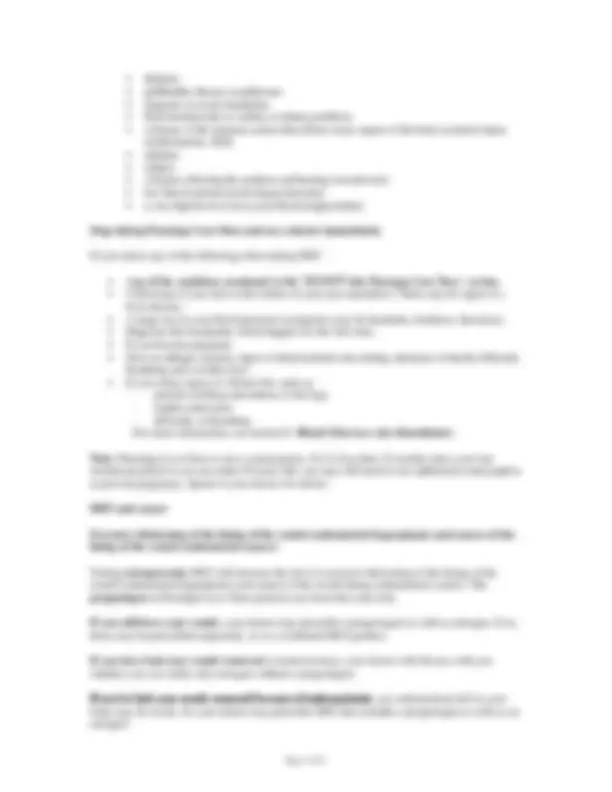
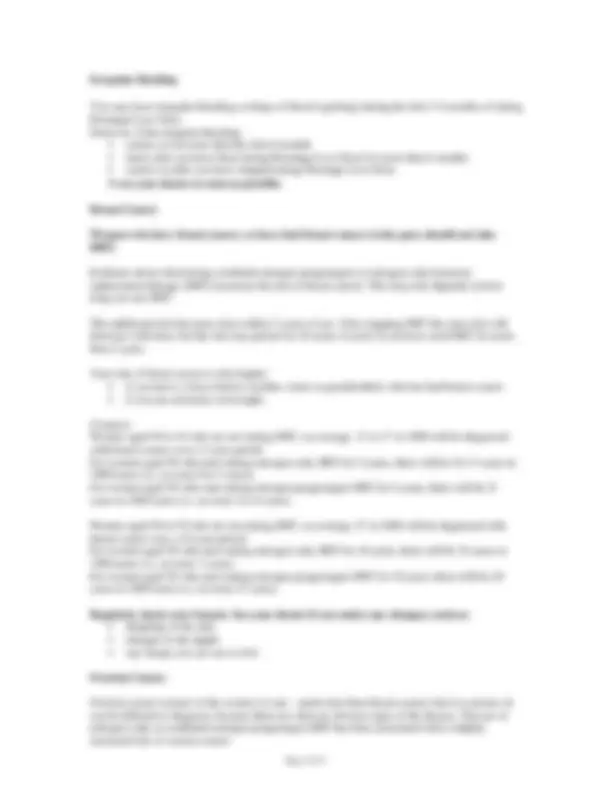
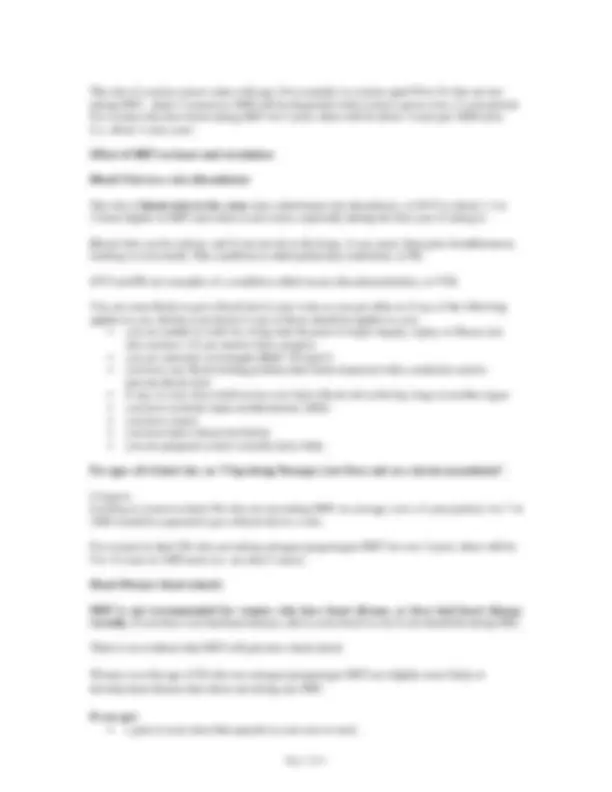
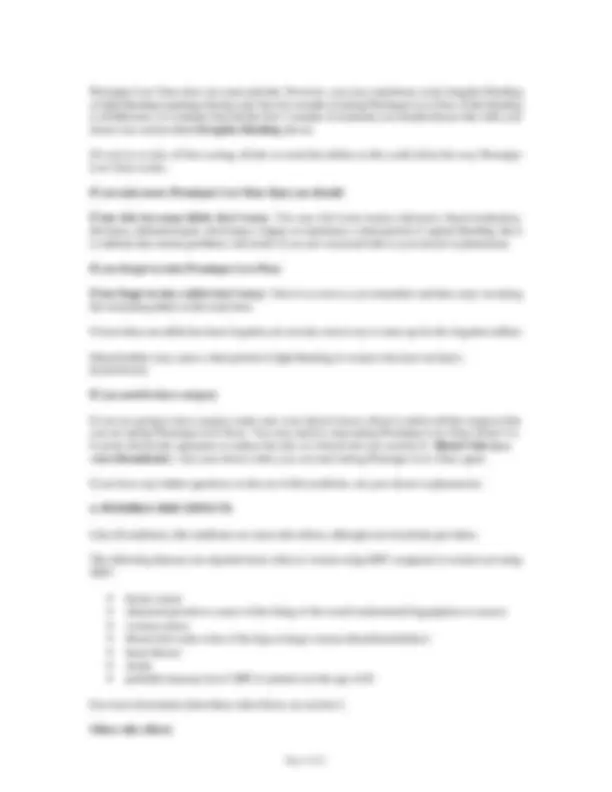
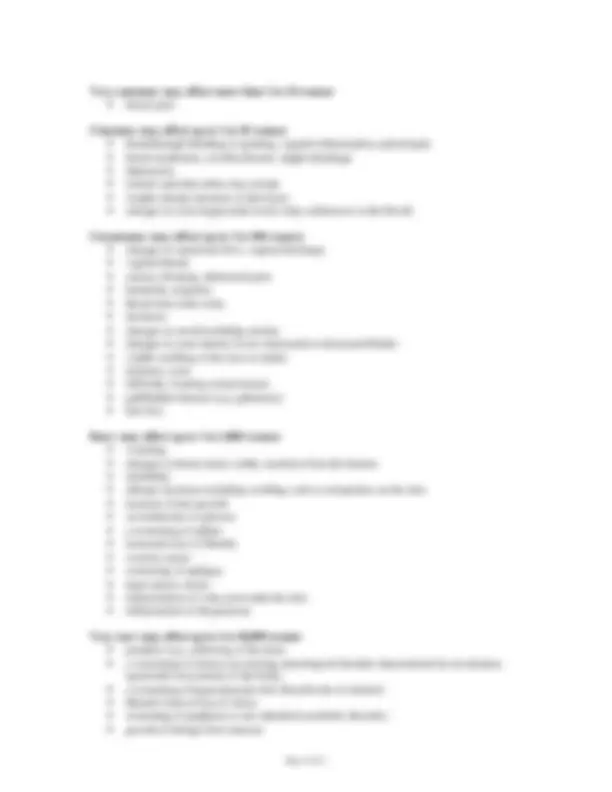
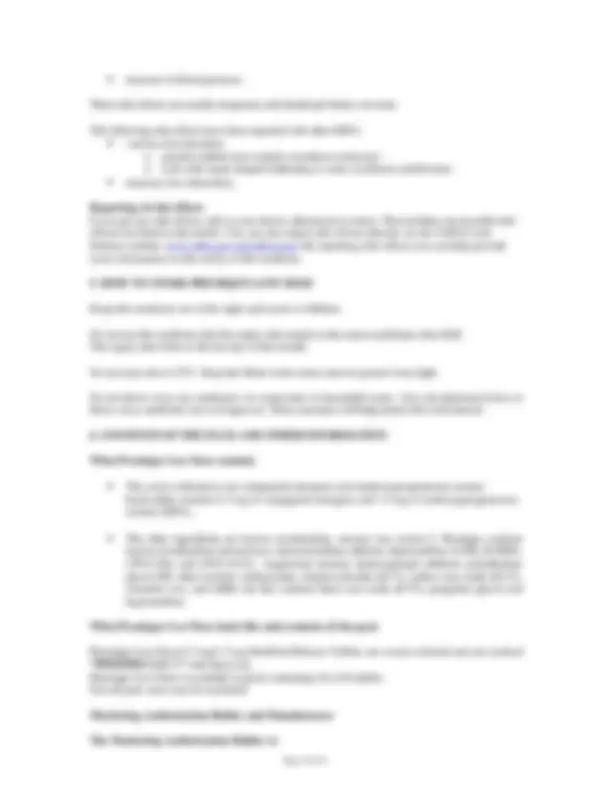


Study with the several resources on Docsity

Earn points by helping other students or get them with a premium plan


Prepare for your exams
Study with the several resources on Docsity

Earn points to download
Earn points by helping other students or get them with a premium plan
Community
Ask the community for help and clear up your study doubts
Discover the best universities in your country according to Docsity users
Free resources
Download our free guides on studying techniques, anxiety management strategies, and thesis advice from Docsity tutors
Essential information about Premique Low Dose, a hormone replacement therapy used to alleviate symptoms of menopause. Learn about its usage, storage, contraindications, and potential side effects.
What you will learn
Typology: Study notes
1 / 11

This page cannot be seen from the preview
Don't miss anything!







Package leaflet: Information for the patient PREMIQUE®^ Low Dose 0.3 mg/1.5 mg Modified Release Tablets conjugated estrogens and medroxyprogesterone acetate Read all of this leaflet carefully before you start taking this medicine because it contains important information for you. ▪ Keep this leaflet. You may need to read it again. ▪ If you have further questions, ask your doctor or pharmacist. ▪ This medicine has been prescribed for you only. Do not pass it on to others. It may harm them, even if their signs of illness are the same as yours. ▪ If you get any side effects, talk to your doctor or pharmacist. This includes any possible side effects not listed in this leaflet. See section 4. What is in this leaflet
Once you have started on Premique Low Dose you should see your doctor for regular check-ups (at least once a year). At these check-ups, discuss with your doctor the benefits and risks of continuing with Premique Low Dose. Go for regular breast screening, as recommended by your doctor. Do not take Premique Low Dose If any of the following applies to you. If you are not sure about any of the points below, talk to your doctor before taking Premique Low Dose. Do not take Premique Low Dose: ▪ If you are allergic to conjugated estrogens or medroxyprogesterone acetate or any of the other ingredients of this medicine (listed in section 6). ▪ If you have or have ever had breast cancer , or if you are suspected of having it. ▪ If you have cancer which is sensitive to estrogens , such as cancer of the womb lining (endometrium) or if you are suspected of having it. ▪ If you have any unexplained vaginal bleeding. ▪ If you have excessive thickening of the womb lining (endometrial hyperplasia) that is not being treated. ▪ If you have or have ever had a blood clot in a vein (thrombosis), such as in the legs (deep venous thrombosis) or the lungs (pulmonary embolism). ▪ If you have a blood clotting disorder (such as protein C, protein S, or antithrombin deficiency). ▪ If you have or recently have had a disease caused by blood clots in the arteries, such as a heart attack, stroke or angina. ▪ If you have or have ever had a liver disease and your liver function tests have not returned to normal. ▪ If you have a rare blood problem called “porphyria” which is passed down in families (inherited). ▪ If you are pregnant, or you are breast-feeding. If any of the above conditions appear for the first time while taking Premique Low Dose, stop taking it at once and consult your doctor immediately. Warning and precautions Talk to your doctor or pharmacist before taking Premique Low Dose. Tell your doctor if you have ever had any of the following problems, before you start the treatment, as these may return or become worse during treatment with Premique Low Dose. If so, you should see your doctor more often for check-ups: ▪ fibroids inside your womb ▪ growth of womb lining outside your womb (endometriosis) or a history of excessive growth of the womb lining (endometrial hyperplasia) ▪ increased risk of developing blood clots (see section 2 - Blood Clots in a vein (thrombosis) for more detail) ▪ increased risk of getting an estrogen-sensitive cancer (such as having a mother, sister or grandmother who has had breast cancer) (see section 2 – HRT and cancer for more detail) ▪ high blood pressure ▪ heart disease (see section 2 – Heart Disease for more detail) ▪ a liver disorder (e.g. a benign liver tumour)
Irregular bleeding You may have irregular bleeding or drops of blood (spotting) during the first 3-6 months of taking Premique Low Dose. However, if the irregular bleeding: ▪ carries on for more than the first 6 months ▪ starts after you have been taking Premique Low Dose for more than 6 months ▪ carries on after you have stopped taking Premique Low Dose ➢ see your doctor as soon as possible. Breast Cancer Women who have breast cancer, or have had breast cancer in the past, should not take HRT. Evidence shows that taking combined estrogen-progestogen or estrogen-only hormone replacement therapy (HRT) increases the risk of breast cancer. The extra risk depends on how long you use HRT. The additional risk becomes clear within 3 years of use. After stopping HRT the extra risk will decrease with time, but the risk may persist for 10 years or more if you have used HRT for more than 5 years. Your risk of breast cancer is also higher: ▪ if you have a close relative (mother, sister or grandmother) who has had breast cancer ▪ if you are seriously overweight. Compare Women aged 50 to 54 who are not taking HRT, on average, 13 to 17 in 1000 will be diagnosed with breast cancer over a 5-year period. For women aged 50 who start taking estrogen-only HRT for 5 years, there will be 16-17 cases in 1000 users (i.e. an extra 0 to 3 cases). For women aged 50 who start taking estrogen-progestogen HRT for 5 years, there will be 21 cases in 1000 users (i.e. an extra 4 to 8 cases). Women aged 50 to 59 who are not taking HRT, on average, 27 in 1000 will be diagnosed with breast cancer over a 10-year period. For women aged 50 who start taking estrogen-only HRT for 10 years, there will be 34 cases in 1000 users (i.e. an extra 7 cases). For women aged 50 who start taking estrogen-progestogen HRT for 10 years, there will be 48 cases in 1000 users (i.e. an extra 21 cases). Regularly check your breasts. See your doctor if you notice any changes, such as: ▪ dimpling of the skin ▪ changes in the nipple ▪ any lumps you can see or feel. Ovarian Cancer Ovarian cancer (cancer of the ovaries) is rare - much rarer than breast cancer, but it is serious. It can be difficult to diagnose, because there are often no obvious signs of the disease. The use of estrogen-only or combined estrogen-progestogen HRT has been associated with a slightly increased risk of ovarian cancer.
The risk of ovarian cancer varies with age. For example, in women aged 50 to 54 who are not taking HRT, about 2 women in 2 000 will be diagnosed with ovarian cancer over a 5-year period. For women who have been taking HRT for 5 years, there will be about 3 cases per 2 000 users (i.e. about 1 extra case). Effect of HRT on heart and circulation Blood Clots in a vein (thrombosis) The risk of blood clots in the veins (also called deep vein thrombosis, or DVT) is about 1.3 to 3 - times higher in HRT users than in non-users, especially during the first year of taking it. Blood clots can be serious, and if one travels to the lungs, it can cause chest pain, breathlessness, fainting or even death. This condition is called pulmonary embolism, or PE. DVT and PE are examples of a condition called venous thromboembolism, or VTE. You are more likely to get a blood clot in your veins as you get older or if any of the following applies to you. Inform your doctor if any of these situations applies to you: ▪ you are unable to walk for a long time because of major surgery, injury or illness (see also section 3, If you need to have surgery) ▪ you are seriously overweight (BMI >30 kg/m^2 ) ▪ you have any blood clotting problem that needs treatment with a medicine used to prevent blood clots ▪ if any of your close relatives has ever had a blood clot in the leg, lung or another organ ▪ you have systemic lupus erythematosus (SLE) ▪ you have cancer ▪ you have had a blood clot before ▪ you are pregnant or have recently had a baby. For signs of a blood clot, see “Stop taking Premique Low Dose and see a doctor immediately”. Compare Looking at women in their 50s who are not taking HRT on average, over a 5-year period, 4 to 7 in 1000 would be expected to get a blood clot in a vein. For women in their 50s who are taking estrogen-progestogen HRT for over 5 years, there will be 9 to 12 cases in 1000 users (i.e. an extra 5 cases). Heart Disease (heart attack) HRT is not recommended for women who have heart disease, or have had heart disease recently. If you have ever had heart disease, talk to your doctor to see if you should be taking HRT. There is no evidence that HRT will prevent a heart attack. Women over the age of 60 who use estrogen-progestogen HRT are slightly more likely to develop heart disease than those not taking any HRT. If you get: ▪ a pain in your chest that spreads to your arm or neck.
▪ Herbal remedies containing St. John’s wort ( Hypericum perforatum ). ▪ Metyrapone (most commonly used in the treatment of Cushing’s syndrome). ▪ Aminoglutethimide (most commonly used in the treatment of breast cancer and Cushing’s syndrome). Laboratory tests If you need a blood test, tell your doctor or the laboratory staff that you are taking Premique Low Dose, because this medicine can affect the results of some tests. Pregnancy, breast-feeding and fertility Premique Low Dose is for use in postmenopausal women only. If you are pregnant or breast- feeding, think you may be pregnant or are planning to have a baby, ask your doctor or pharmacist for advice before taking this medicine. Driving and using machines There is no evidence to suggest that Premique Low Dose will affect your ability to drive or to operate machines. Premique Low Dose contains lactose monohydrate and sucrose Premique Low Dose contains lactose monohydrate and sucrose. If you have been told by your doctor that you have an intolerance to some sugars, contact your doctor before taking this medicinal product.
3. HOW TO TAKE PREMIQUE LOW DOSE Instructions for proper use Always take this medicine exactly as your doctor has told you. Check with your doctor or pharmacist if you are not sure. The recommended dose is one tablet every day. Your doctor will aim to prescribe the lowest dose to treat your symptom for as short as necessary. Speak to your doctor if you think this dose is too strong or not strong enough. Take your tablet at the same time each day as this will help to remind you to take your medicine. If you are not currently taking HRT or you are taking another period-free HRT, you may start your first pack of Premique Low Dose at any convenient time. If you are changing from an HRT product that gives you a monthly bleed, start Premique Low Dose the day after you finish the course of the previous product, unless instructed otherwise by your doctor. Begin your pack of Premique Low Dose by taking the first tablet marked for that day of the week. Continue to take one tablet each day following the arrows until all 28 tablets have been taken. While you are taking Premique Low Dose you will have no tablet-free days. You should start your next pack the day after you finish the previous one.
Premique Low Dose does not cause periods. However, you may experience some irregular bleeding or light bleeding (spotting) during your first few months of taking Premique Low Dose. If the bleeding is troublesome, or continues beyond the first 3 months of treatment you should discuss this with your doctor (see section titled Irregular bleeding above). Do not try to take off the coating, divide or crush the tablets as this could affect the way Premique Low Dose works. If you take more Premique Low Dose than you should If you take too many tablets don’t worry. You may feel some nausea (sickness), breast tenderness, dizziness, abdominal pain, drowsiness, fatigue or experience a short period of vaginal bleeding, but it is unlikely that serious problems will result. If you are concerned talk to your doctor or pharmacist. If you forget to take Premique Low Dose If you forget to take a tablet don’t worry. Take it as soon as you remember and then carry on taking the remaining tablets at the usual time. If more than one tablet has been forgotten, do not take extra to try to make up for the forgotten tablets. Missed tablets may cause a short period of light bleeding in women who have not had a hysterectomy. If you need to have surgery If you are going to have surgery make sure your doctor knows about it and/or tell the surgeon that you are taking Premique Low Dose. You may need to stop taking Premique Low Dose about 4 to 6 weeks before the operation to reduce the risk of a blood clot (see section 2 - Blood Clots in a vein (thrombosis). Ask your doctor when you can start taking Premique Low Dose again. If you have any further questions on the use of this medicine, ask your doctor or pharmacist.
4. POSSIBLE SIDE EFFECTS Like all medicines, this medicine can cause side effects, although not everybody gets them. The following diseases are reported more often in women using HRT compared to women not using HRT: - breast cancer - abnormal growth or cancer of the lining of the womb (endometrial hyperplasia or cancer) - ovarian cancer - blood clots in the veins of the legs or lungs (venous thromboembolism) - heart disease - stroke - probable memory loss if HRT is started over the age of 6 5. For more information about these side effects, see section 2. Other side effects
Pfizer Limited Ramsgate Road Sandwich Kent CT13 9NJ United Kingdom The Manufacturer is : Pfizer Ireland Pharmaceuticals Little Connell Newbridge County Kildare Republic of Ireland. This leaflet was last revised in: 09 / 2020 Ref: PQ 10 _